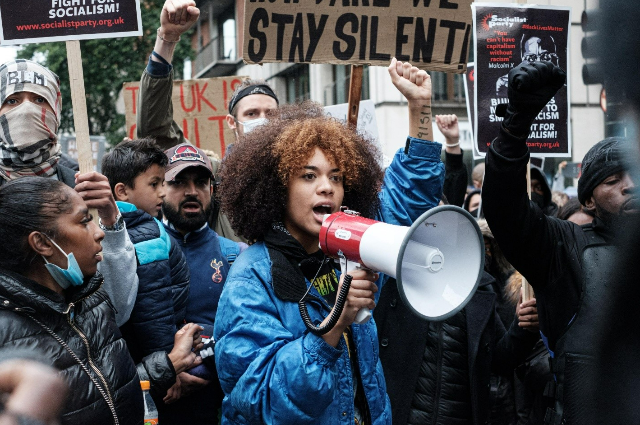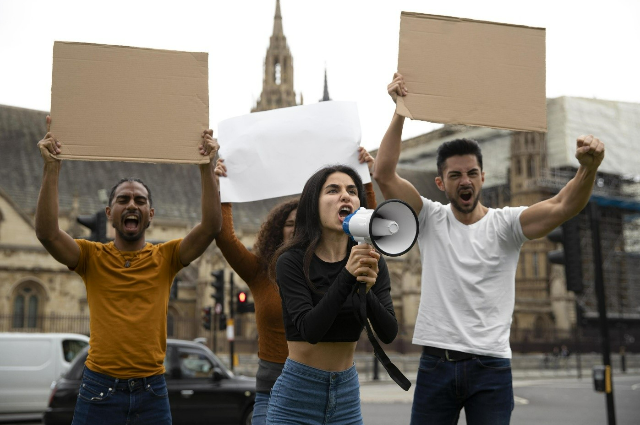
Image by Ehimetalor Akhere Unuabona / Unsplash
INTRODUCTION: CONCEPT OF STATE
Whether we like or dislike politics, we all are part of a political system. Society is not synonymous with ‘state. A society has many institutions such as family, school, religious organization etc. State is one of the most important institutions of society of political nature. The word 'political' implies anything that is to do with public. When people organize themselves in such a way that few people can create laws and enforce it on the public and if a person refuses to comply, he can be coerced into obedience we call it ‘State’.
State is a concept or idea that materializes itself into ‘government’. Terminologies may sound trivial but for the sake of curiosity and conceptual clarity, I must explain the difference. Governments are temporary, State is more or less permanent. The ‘Republic of India’ is a sovereign state, BJP, Congress and other parties that form a government come and go. The government in power may lose its majority in Lok Sabha, and maybe compelled to resign but fall of the government is not fall of the state. India is a state as long as India isn’t enslaved by some other power. For example, India was once a part of the British empire. The Indian society still existed, but the dream of Indian state was only realized when we gained our freedom for with freedom came the sovereignty. Government only exercise sovereignty on the behalf of the state.
There have been various forms of governments. The ancient monarchies gave away to democracies in modern times. Although, other forms of governments are still prevalent yet democracy has gained popularity.
The Rulers and Ruled:
By virtue of our birth we all our citizens of some State. Being born in India makes us Indian citizens naturally. Within State we find few people have a lot of power over the larger general public. The society is divided into the power holders and powerless or rulers and ruled or governed and governors.
To be or not to be a part of this political system is the question? Why should we allow few people to decide for us? Why should we go by these laws? Ultimately, what is the benefit of this type of political system?
Well, in words of Aristotle we all our political animals and only an angel or a beast is fit to live outside the state. Aristotle also lays emphasis on the significance of state by saying that the very emergence of the state is for the sake of good life and it continues to exist for the sake of good life.
Within this system, we develop our mental faculties and try to achieve our best possible self. Without state we may survive but within state we actually grow.
In the ancient times, the rights of citizens were limited. In present times, especially in democracies we not only participate in government making but also enjoy various rights in a capacity of a citizen.
COMMON GOOD Versus PUBLIC INTEREST
If we lived in utopia, we may not have bothered about presence or absence of a political system but in real world we are occupied with problems. One of the biggest issue is of conflicting interests in the society. Every group be it of any kind, raises its concerns. Some interests seems to be of mutually antagonistic nature such as of employee and employer; rural and urban; caste based interests, religion based interests etc.
With so many interests, intellectuals try to figure out what is actually good for the whole community in general. Democratic policy makers try to make policies which would be more like a compromise between all kinds of interests. They try to prioritize what’s best for the country. A good citizen wouldn’t mind giving up on few self-interest for the sake of common good.
Distinction should be made between ‘common good’ and’ public interest’. Common good is more to do with the moral philosophy of ‘what is good for the community as whole’. It demands citizens to abandon their selfish self-interests for the welfare of community as a whole. Public interest is a matter of policy-making and administration. Public interest is the decision of the public to pressurize legislators and policy-makers to consider their opinion. Both are essentially similar in essence, but the terminological use vary with context. If a soldiers dies while fighting for his country, his death is for the common good but his death is not a matter of public interest. For a soldier’s death is neither the decision of public nor a matter of public policy. But since his sacrifice is for a moral cause (honour of his country), it is for the common good. Common good has a wider scope.
MODERN CONSCIOUSNESS
The problem of racial discrimination, gender inequality, caste-based discrimination, superstitions over science etc. had held back our development in the past more strongly than in the present times. Once the society used to boldly advocate against the women education and now not educating girls is seen as weird. We always see a scope of improvement in the society.
There is an idea of ‘modern consciousness’ presented by D.D Raphael. He holds this optimistic view that with time society progresses. The Supreme Court of India has stated that legislation should always be such a manner that laws are progressive and not regressive in nature.
DEGENERATION OF DEMOCRACY

Image by Rebellion created by Freepik
Sometimes the wit of the public may work against the common good. Plato resented democracy. His hatred was rooted in the death of his teacher Socrates. The democratic government of Athens punished him. He was accused of misguiding the youth. Seeing the death of his genius teacher, Plato could not help but condemn democracy as the worst form of government.
But in the contemporary world, we see a lot of democracies. All democracies are based on this pre-conceived notion that an ordinary man is enlightened enough to know his good and the good of his society. A lot of civic and political liberty has been bestowed on a common citizen. The rights go as far as to criticize and protest against the decisions of the state.
For a healthy democracy , protest is good but in an unhealthy democracy where citizens coerce the authorities to take back their policies every now and then is not good. Because, it showcases disbelief in the authorities. How could a democracy work, if the citizens do not have any faith in their institutions? A lot of public violence and vandalizing of public properties have been witnessed which is not good for the country.
Alexis de Tocqueville calls this attitude as ‘tyranny of majority’. It is dangerous. The more the public opinion will try to supersede the authorities, the more the authorities will try to curb the liberty of the citizens by centralizing their powers. The net result is a distorted democracy.
The Vaccine for Ailing Democracy:
The question is “Is democratic government failing us?” No. It is far better to have a democratic form of government where citizens can express themselves than a dictatorial regime where opinion of citizens is of least significance. Democracies aren’t failing us, it is only developing at a slow pace.
If we really want to accelerate it, we need more civic sense and awareness .
Winston Churchill once said, "The worst argument against democracy is a five minute conversation with an average voter.”
Alexis de Tocqueville do not opposes democracy but insist on free media to increase the awareness of the citizen. As the public opinion which is formed by fake news, rumours and mispropaganda is not good.
Media these days has become the instrument of the party in power. Which is why the fourth pillar is really losing its worth and the negative impact is faced my citizens. There is no better vaccine for ailing democracy than knowledge and awareness.
It is through this a sound and logical public opinion can be formed. It is the best tool to politically educate the citizens and make them responsible. A good state is made from good citizens.
Public Interest Issues in Democracies:
If a government expects discipline and obedience of law from citizens, citizens too expect liberty and their welfare from the government.
Their needs should be attended and given the due priority. Local initiatives should be encouraged. Building the skills and capacity of citizens is one of the most important task any state should work upon. In India we have been given the facility of ‘Right to Information’ and ‘Public Interest Litigation’.
Some of the public interest issues that have been concerning revolves around animal, children and youth, women, elderly, promotion of arts and entertainment, LGBTQ, farmers, migrant workers, prison issues, hunger and poverty, corruption etc.
Not only raising issues, but also coming up with suggestions should be the exercise while holding strikes. Let citizens reflect on the issues from the perspectives of a philosopher and policy- makers. That is one of the finest way in which democracies can grow.
CONCLUSION
In the enlightenment of the citizen lies the key to our development. Local initiatives , sound arguments, rising above caste, creed, religion and region for common good, solution-oriented and analytical thinking is what we need. The citizen that has power to vote has power to bring change too. Most non-democratic countries have silenced their citizens and they are made to obey without questions. Cunning politicians are best benefitted from the ignorance of the citizens, but that state never prospers whose citizens our ignorant. Wise citizen chooses leaders carefully, questions rationally, put demands genuinely and if required protests fearlessly.
